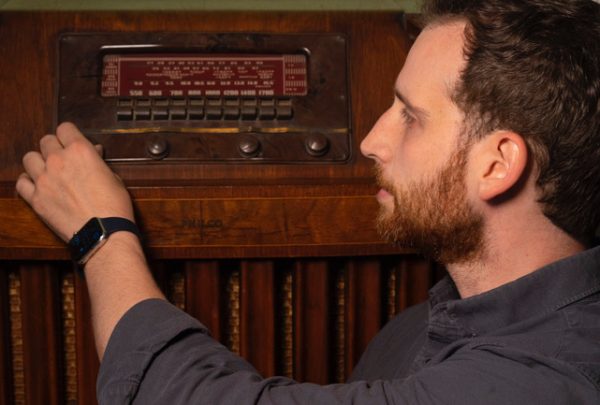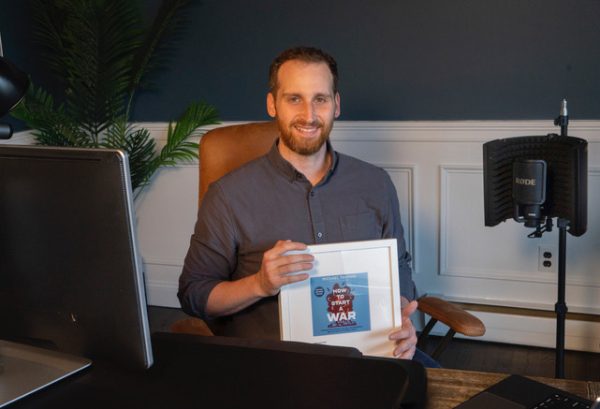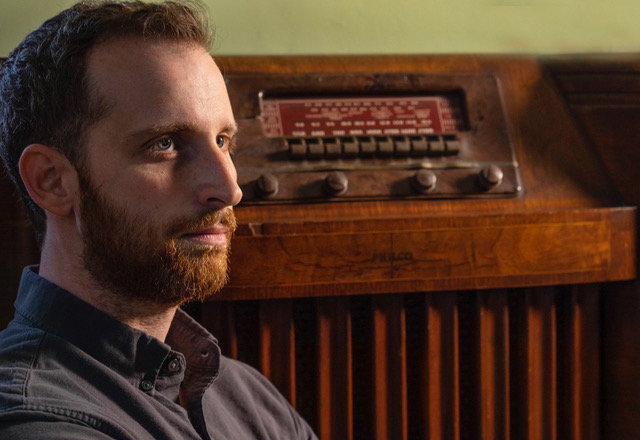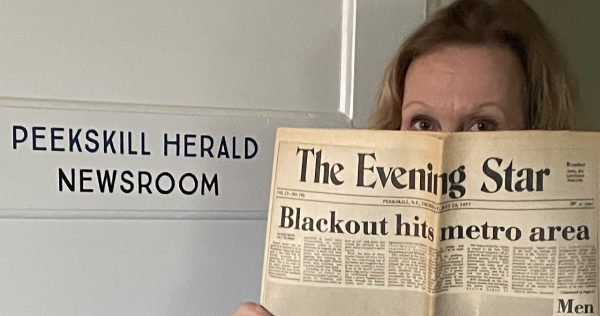A technology and data professional by day; history and old-time radio buff by night, Michael Trapani of Peekskill celebrates the debut of his audiobook, How to Start a War: The rise of extremism, the fall of democracy and the lead up to World War II.
The first book for Trapani, who has written for the Herald, was six years in the making, adapted from a miniseries and podcast he began in 2015.
“It’s a story about the past that can help us understand our world today,” says the 33-year-old father of two. Each installment in the nine-chapter book connects lessons from World War II history to present-day domestic and geopolitical events, he adds.
The book was produced as an audiobook because its conversational style lends itself to listening rather than reading. Read by Trapani, How to Start a War includes recreated audio clips based on transcripts of Hitler’s cabinet members Hermann Goring and Joseph Goebbels making phone calls to plot their takeover, win elections, and propagandize the war.

Trapani’s true-crime style of story-telling appeals to history lovers and non-lovers alike. Organized chronologically, the chapters give insight into the Nazis’ rise and consolidation of power, narrative of fear, and Hitler’s chancellorship, giving parallels to today’s world. The book’s common theme: How good people could’ve taken action at any point to prevent the war and Holocaust. Just like today, says Trapani.
“There’s a similar lack of engagement in our current society, especially in our political system, and a cynicism that we need to be aware of and correct.” For example, he says, the Nazis never had a majority in the parliament, yet the lack of a unified opposition made it seem like they did.
Trapani estimates spending at least 100 hours researching original Nazi transcripts and diaries, and listening to recorded conversations and audio for the book. Much of this documentation, he says, he easily searched online from the Library of Congress and other resources. “There’s no shortage of research and information.”
Produced in the style of the Golden Age of radio, from the 1920s through 1950s, Trapani lets readers listen in, almost as though they were in the room, when Nazis planned their New World Order. “It felt natural to tell the story that way,” he says.

As another example, Trapani says Goring was interrogated post-war at the Nuremberg Trials, and much of his testimony and court records were transcribed and available online.
Calling the Nazis “evil criminals,” and World War II “the crime of the century,” Trapani says that evil happens when good people fail to take action. “The dramatic series of events that led to the outbreak of World War II and the criminals who carried it out, are not stories of evil genius, but the lack of engagement and resolve from their opponents to stop them. Just like the evil that happens in this world, the good that happens in the world was caused by people who realized they had the power to be the change in the world they want to see.”
“With that power, if things are going in the wrong direction, you have an obligation to be that last check against tyranny or worse. No amount of cynicism can absolve you of that sacred charge.”
The Long Island native, who spent decades living in New York City before moving to Peekskill three years ago, liked studying history for as long as he can remember. “As a kid, I was always interested in transitional moments in history, like the fall of the Roman Empire and Soviet Union, and the Civil War. I think inflection points in history are interesting.”
He attributes his love of the Golden Age of radio to his grandparents, Rosario and Nelbar Trapani, who gave him recordings of classic old shows like the Lone Ranger, Jack Benny, and Burns and Allen growing up. “I listened to those while I fell asleep,” Trapani recalls. “The shows taught me about how to leverage the medium. An incredible amount of talent and thought went into those shows. Radio is a medium that is underappreciated, but now, with podcasts and audiobooks it’s being remembered. This book is a great way to bring that era back.”
With a history degree from Fordham University in the Bronx, N.Y., Trapani pursued his love of history throughout the years in the margins of his life, while building a career in technology for places like Apple and IBM.

“This audiobook is nothing short of a dream come true. I thank all those who supported me: my wife who was in the next room as I worked on this for last several years; my grandparents who were an early influence; my dad who was someone I felt connected to while writing this; and my sons, who I very much wrote this work for.”
While Trapani isn’t Jewish, he feels a strong connection to the Holocaust because his wife Stephanie is Jewish, and his sons will carry on the heritage.
As for the book’s relevance today, Trapani adds: “It’s good to zoom out and see things in the lens of history. While some things haven’t happened in our lifetimes, it doesn’t mean they haven’t happened before.” For example, he points to the occurrence of political divisions. “We’re living through a time of intense political divisions. They’ve happened before; they’re not new. You realize that people have been through these things before.”
“The main takeaway from How to Start a War is the idea that people have power, even if it’s easy to think you don’t. The good in this world was caused by people who understood that they had the power. Sometimes it’s one person who can make a difference, or a number of people who think they can make an impact together.”
How to Start a War is available on Amazon, Audible, Barnes and Noble, Apple, and where audiobooks are found.





